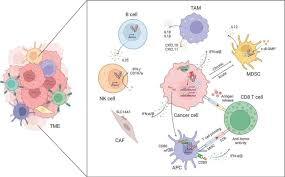Cancer Research: Unlocking New Therapeutic Pathways
Introduction
Cell signaling in cancer research plays a crucial role in understanding tumor development and uncovering potential therapeutic pathways. By examining how cancer cells communicate and proliferate through these signaling networks, researchers can develop more targeted treatments to fight the disease. This article explores the significance, components, and advancements in cell signaling within cancer research, providing insights into how this knowledge is shaping future cancer therapies

Understanding Cell Signaling
Cell signaling involves complex communication networks that regulate cellular functions such as growth, differentiation, and apoptosis. In cancer, these signaling pathways often become dysregulated, leading to uncontrolled cell proliferation and tumor development.
Key Signaling Pathways in Cancer
1. PI3K/AKT/mTOR Pathway
This pathway is critical for cell survival and growth. Its dysregulation is commonly observed in various cancers, making it a promising target for therapeutic intervention.
2. MAPK/ERK Pathway
Involved in cell division and differentiation, the MAPK/ERK pathway is frequently hyperactivated in tumors. Understanding its role helps in the development of inhibitors to block cancer progression.
3. Notch Signaling
Notch signaling contributes to cell fate determination and is implicated in cancer stem cell maintenance. Targeting this pathway could be effective for eliminating cancer stem cells.
The Role of Cell Signaling in the Tumor Microenvironment
The tumor microenvironment (TME) consists of cancer cells, stromal cells, and immune cells that interact through signaling molecules. These interactions facilitate tumor growth, metastasis, and resistance to treatments.
Angiogenesis
Cell signaling promotes angiogenesis, the formation of new blood vessels that supply nutrients to tumors. Inhibiting angiogenic signaling can starve the tumor and slow its growth.
Immune Evasion
Cancer cells exploit signaling pathways to evade the immune system. Understanding these mechanisms leads to the development of immunotherapies that enhance the body’s ability to fight cancer.
Advances in Cancer Research
Targeted Therapies
Targeted therapies focus on specific signaling molecules involved in cancer progression. By inhibiting these targets, treatments become more effective and less toxic.
Biomarker Discovery
Research in cell signaling aids in discovering biomarkers that predict treatment responses and disease outcomes. This allows for more personalized and effective cancer care.
CRISPR and Gene Editing
CRISPR technology enables precise editing of genes involved in cell signaling. This opens possibilities for correcting mutations and understanding pathway functions in cancer.
Challenges and Future Directions
Drug Resistance and Pathway Redundancy
Despite progress, challenges such as drug resistance and pathway redundancy remain. Ongoing research aims to develop combination therapies and novel inhibitors to overcome these hurdles.
Integrating AI in Research
Artificial intelligence (AI) is increasingly used to analyze complex signaling data, providing new insights and accelerating cancer research.
Conclusion
Cell signaling is at the forefront of cancer research, offering pathways to innovative treatments and improved patient outcomes. By continuing to unravel these complex networks, scientists hope to unlock new therapeutic strategies and ultimately conquer cancer.
